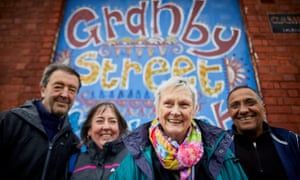To revive their derelict area in Liverpool, a group of residents had to take it over. The latest article in our new economics series looks at one of the most remarkable stories in British urban history
• Listen to Aditya Chakrabortty talking about game-changing economic models on The Alternatives podcast

The revolt began suddenly one weekend, with a loud banging at some godawful early hour. From their bedroom windows, neighbours could see Eleanor Lee – wilful, hippyish Eleanor – hacking up concrete in the garden next door so that she could plant ivy.
It was the mid-2000s, and it had been a long time since green shoots had sprung up on Cairns Street. Over the past couple of decades, it and the neighbouring three streets on Granby, in Liverpool’s L8 postcode, had been emptied of nearly all life. Families had been moved out by housing associations, their homes tinned up and the bricks painted black. Lee came home one day to find both sets of neighbours had gone. At rock bottom, her street of 68 small Victorian terraced homes had only eight households.
What replaced the humans was junk. Year on year of junk. Granby 4 Streets became the fly-tipping centre of Liverpool. Used mattresses lined the pavements. Street lighting was patchy. Local children would walk to school past all this filth, knowing the world saw them as little better.
“What it said was that the people who live here are utterly dispensable,” says Lee. “That we don’t give a shit.”
She had had enough. The rage that had been building inside her for years drove her outside that morning, with no other objective than to put down a line of plants connecting her door with those others left on the street.
The neighbours watched. Then, one by one, they started to muck in. And so began one of the most remarkable stories in British urban history.
Perhaps you’ve heard of Granby. You may recall how the Turner prize was awarded in 2015 to plans to breathe life back into this deserted cluster of streets. Lee and her friends certainly remember the ensuing melee, with China Daily on one phone and the New York Times on the other.
The write-ups were fun and funny and heart-warming, and mainly missed the vital part about politics. Because what these women – and the central characters are nearly all women – have done is beat a housing system that comprehensively failed their community, and then judged that community a failure.
Assert that Britain’s housing market is broken and barely an eyebrow rises. This winter in London, around a thousand people are sleeping in doorways and under park benches, even as half the 1,900 multimillion-pound flats built there last year stand empty. Despite the tens of billions David Cameron and Theresa May have chucked at it, the market has failed to produce the homes Britain needs. But it did enable the boss of Persimmon to pocket a £110m bonus last Christmas.
Britain has not one but many housing crises, which share a common theme: we no longer live in homes but a global asset class, to be traded and stockpiled by anyone with ready financing. What the Granby women have done is reverse this state of affairs, so that houses are turned back from commodities into community assets. And they’ve pulled it off with wit, grit and brilliant strategising.
An easy walk from Liverpool city centre and lined with trees and handsome redbricks, Granby should be thriving. Instead, it’s almost been killed by a combination of market and political failure. One of the oldest black communities in Britain, it has long suffered discrimination from employers and authorities. The local economy got barely a chance; the housing stock never received enough investment; the residents seethed with justified resentment. The place felt combustible. A 1972 Shelter report on the districtquoted a police sergeant: “Society throws its rubbish in a dustbin and then expects the policeman to sit on the lid.”
That lid blew off in 1981, in what the press labelled the Toxteth riots. Lee, who had moved into Cairns Street five years before, remembers the “wild” policing and how a friend was left bleeding by a paving stone lobbed by an officer.
Even as Thatcher’s ministers were urging her to abandon Liverpool to “managed decline”, the city council was applying precisely that policy to the L8 area. It planned to empty it – then flatten it and start all over again. Housing associations were encouraged to abandon their properties; the community was sent scattering. It was town planning as epic punishment, and a market that valued people’s lives at little more than zero.
This great clearance went on for decades. Despite residents’ protests, street after street was demolished until only four were saved. Formerly a senior manager with Liverpool Housing Trust, Ronnie Hughes remembers how, as late as 2010, people were pushed into “selling their homes to the council for £8,000”.

“Granby was the greatest social injustice done to any single group of people in the history of Liverpool,” he says. “It was racial and class discrimination over a period of at least 50 years.”
In the middle of this dystopia, up pop Eleanor Lee and her neighbours. Councillors won’t support them; party machines don’t know what to do with them. But they are natural agitators. They clean streets, paint empty homes, even win gardening awards. Over bricked-up bay windows, they depict scenes of cats peeking from behind curtains.
“It was the spirit of ‘Fuck, this is depressing – let’s make it a bit better’,” says Theresa MacDermott, who’s lived on Granby for 30 years. Yet they were not only prettifying their streets; they were upending the property system. If, as the cliche says, an Englishman’s home is his castle, the unvoiced corollary is that his neighbour’s house is a fortress. To tamper unasked with the property next door is usually neither profitable nor legal. Now these terraces had been abandoned by everyone else, the women were turning them into a commons for anyone left to protect.
“Those people spiritually owned that land,” says Hughes, who began working with the women around this time. “Time after time, they’d stopped it being utterly demolished. They were the only ones who cared about it.”
While their councillors wielded wrecking balls, the residents thought long term. Once the streets had been tidied, the couple of dozen households began an outdoors market in 2010. The wares were distinctly ropey: picture plates of Daniel O’Donnell and crap tea at 20p a cup. But hundreds of visitors turned into thousands and it became a monthly event – and brilliant advertising. “It was us saying [to the rest of the city], ‘We’re here. Don’t forget we exist’,” says MacDermott.
Then came their most audacious move: they set up a community land trust(CLT), with no land, no paperwork and only a vague idea of what it was. “We formed a CLT on nothing but imagination,” says Lee’s neighbour, Hazel Tilley. It was both common sense and utterly radical.
In Britain CLTs have existed for just over 20 years and only made it into law in 2008. Today they are fashionable among politicians of all persuasions: just last week, London’s Labour mayor Sadiq Khan granted two plots of capital land to CLTs, while last month the Conservative government stuck a few hundred million into a community housing fund. But at the start of this decade, Liverpool’s deputy mayor, Ann O’Byrne, reckons that of the council’s 20 housing officers, few even knew what a CLT was. Granby’s residents’ association had been ground down by constantly fighting demolition – yet in starting one of the first city CLTs, the community now had both a legal entity and a vehicle to own and build on land as a collective. “Everything that had happened here had happened because there was no ownership of land,” says Lee. “You were utterly at the mercy of the city council and the housing associations.”
For four decades Granby’s residents were lab rats in every half-baked urban experiment going. They’d had Michael Heseltine’s brainwaves, shady developers promising big investments, New Labour’s funded demolition, local task forces – and all had failed them.

When the council’s latest deal with a builder fell apart at the end of 2012, the CLT hand-delivered its own proposal to the city’s key decision-makers. “We [have] stopped waiting for top-down regeneration and started doing it for ourselves and by ourselves,” it noted, calling on the town hall to ditch the big partners and grand announcements, and instead support a mix of small initiatives.
Exhausted officers were finally willing to listen, especially with O’Byrne championing Granby’s cause. But what secured the women a seat at the table was money: impressed by their achievements, a social investor loaned the group half a million, then other foundations got on board. Without cash, the CLT would not be more than a formality; but without the formality of the CLT, the cash may never have been forthcoming.
Granby today is a busy place. Lorries pile in and out and the streets echo to the sound of hammering as, for the first time in generations, things are being built here rather than knocked down. The CLT bought 13 of the Cairns Street terraces for a quid each off the council, and invested hundreds of thousands into making them habitable.
The two most neglected properties will be knocked together into an indoor garden and community meeting space. The other 11 will be rented or sold, all at genuinely affordable rates, to people in genuine need of housing who can show connections and commitment to the neighbourhood. Leased properties will be resold with the same conditions – and their value will be pegged to local wages, rather than market prices. As Stephen Hill, the doyen of urban CLTs, writes, this changes the very meaning of the land: it is no longer about what money can be generated from it, but what use can be made of it. Thanks to the Turner hoo-ha, the first lets attracted nearly 180 applications from as far away as New York – for an area that 10 years ago no one would move to.
That a bunch of housing protesters are now property developers is remarkable enough, but they have done more than own a few of the area’s 150-odd houses. They have make Granby that rare thing in Britain: an area shaped in the image of its community. The big landlords locally have adopted its conditions into their lettings policies. Now run by the CLT, the street market has become both the best market in Liverpool, and a launchpad for startups. MacDermott talks about the Italian who began selling deep-fried mini-pizzas (“proper sourdough, just gorgeousness”) one Saturday a month and now makes a living from catering. His business is one of a handful made in Granby in the past few years; the trust hopes to incubate more with small loans and the offer of space in the empty corner shops. There’s plans to take on a small business adviser, too: “We want to kickstart this economy.”
It sounds almost cosy; but Colin Ward, the great anarchist writer on housing, would recognise its radicalism. Rather than paternalistic bureaucracy or careless markets, Ward argued for “dweller control” – for the tenants to shape where and how they live. That is exactly what the residents of Granby are now exercising. They have fought off crass interference, steeped themselves in the technicalities of housing, and raised millions in funding. In their 20s and 30s when the process began, they are now in their 50s and 60s: but it is far from complete
One of the four streets remains derelict, while over the road another derelict estate has been handed by the council to the kind of big-city developer that reliably let down the Granby residents. On the Welsh Streets, houses will be rented for double the rate they charge in Granby. Having once ditched the area, the private sector is back – and extracting healthy profits from the value generated by those few residents who stayed.
Eleanor Lee tots up all the things the CLT should do next: finish the construction, hold open meetings, start a newspaper, get more local shops going. Most of all, “I’d like to see a multiracial area in this city that wasn’t code for poverty.”
Fixing us lunch in her kitchen, Hazel Tilley is kinder on her community’s achievements. “We can’t change the world; we can only change our tiny bit. I look out the window and I’m totally cheered by seeing houses with people living in them.” She stirs the chicken noodle soup, then looks up. “Bearing in mind we’re ordinary people, what we’ve done is magnificent.”
• Aditya Chakrabortty is a Guardian columnist. He will chair a Guardian Live event at the University of Central Lancashire in Preston on Monday 12 March. For details visit theguardian.com/guardianlive.
• We’d like to hear what your community is doing to resolve problems like those facing Liverpool. Share your stories via our form and we will be in touch
To learn more, please visit: The Guardian

/cdn.vox-cdn.com/uploads/chorus_image/image/57842749/kids.0.png)




